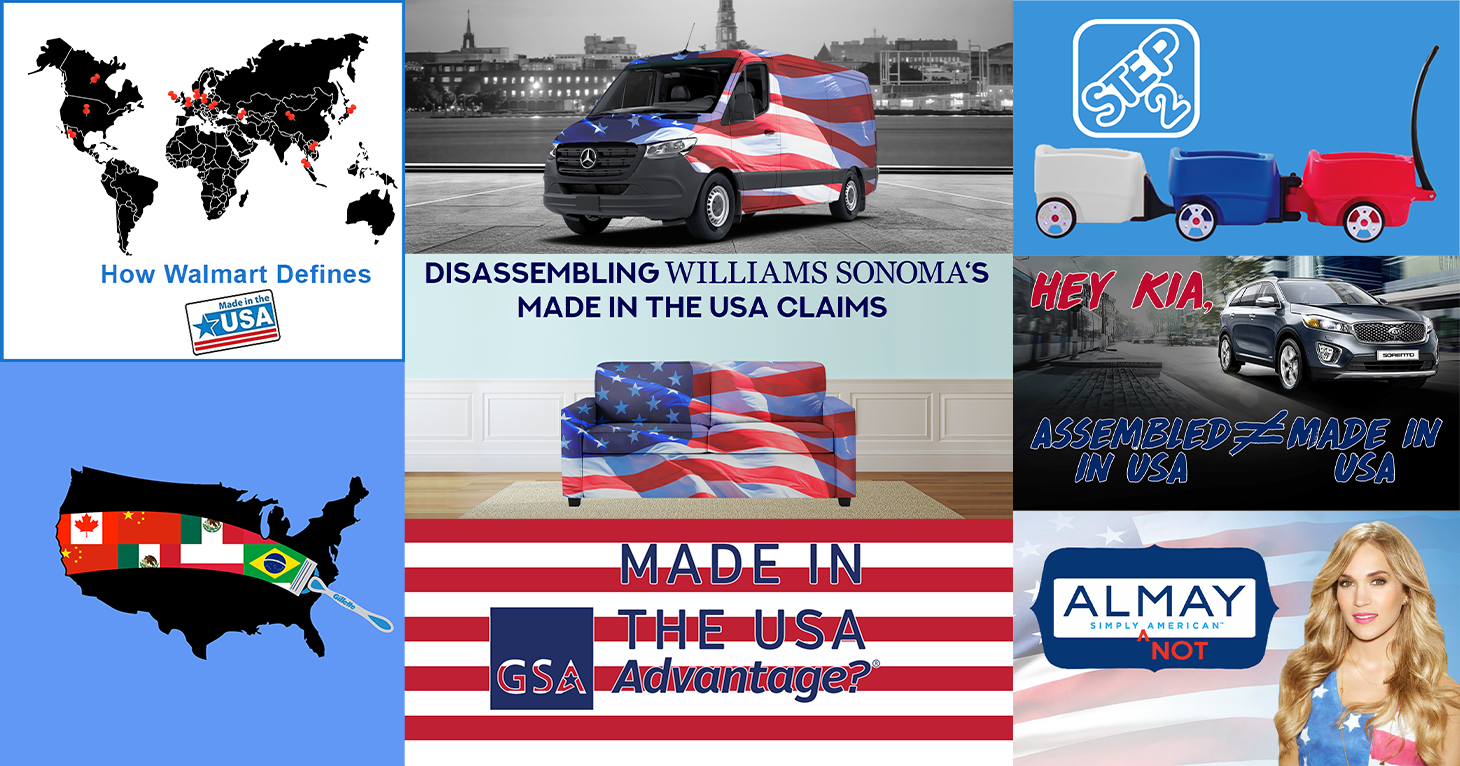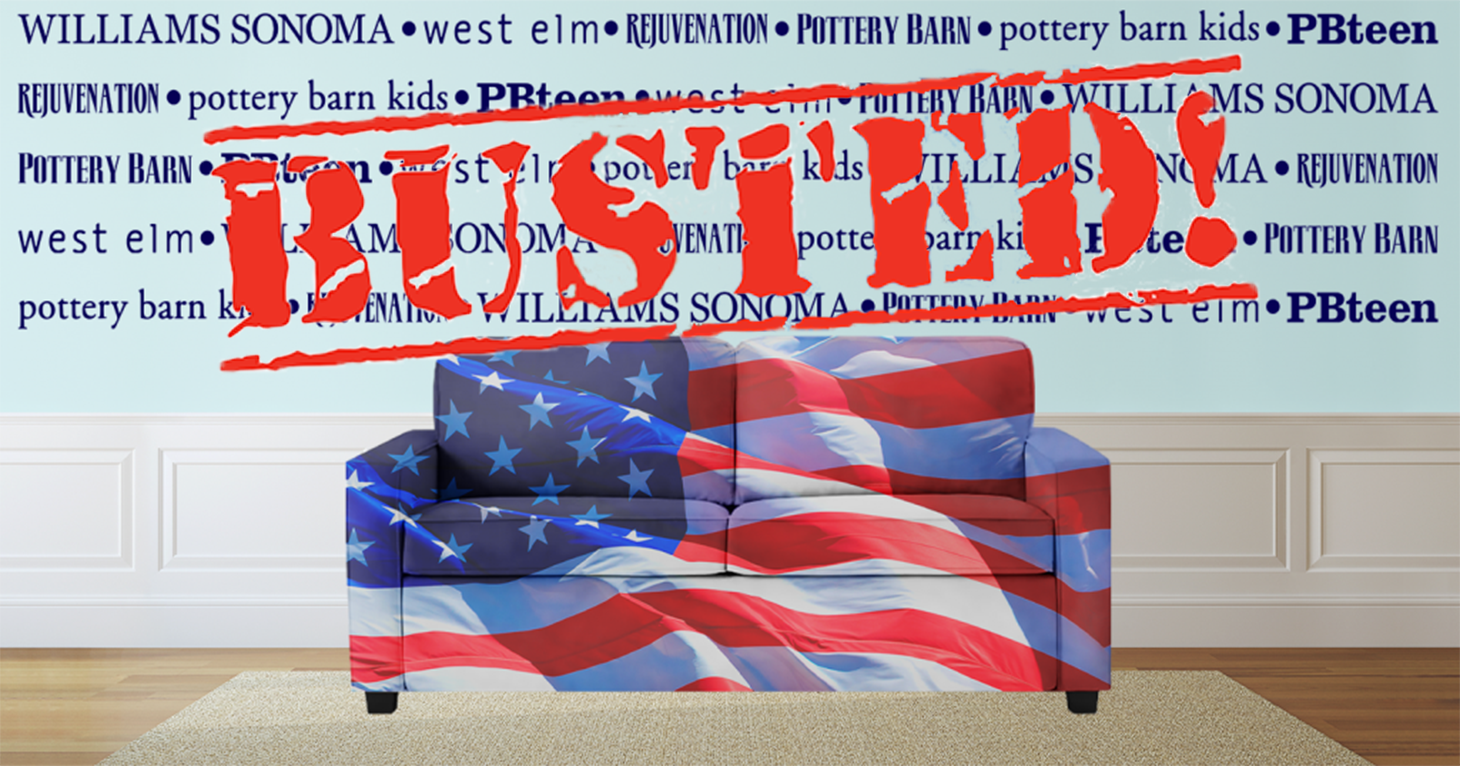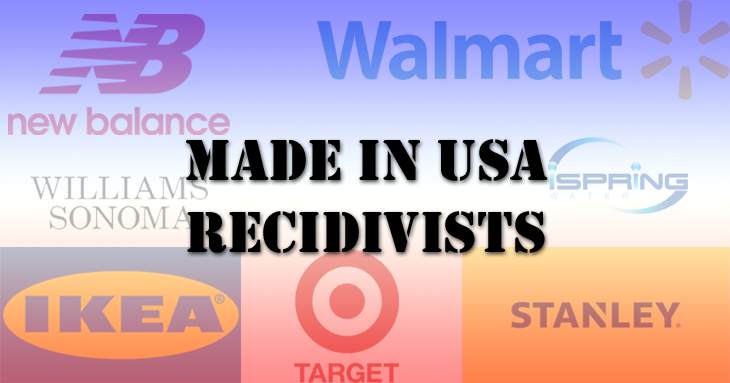
TINA’s Take: FTC Takes Crucial Step Forward in Holding Deceptive Made in USA Marketers Accountable
FTC finalizes its Made in USA Labeling Rule.
A review of TINA.org’s work uncovering (and putting an end to) deceptive made in the USA ad campaigns.
|
Editor’s Note: In a 3-2 vote, the FTC in July 2021 finalized its Made in USA Labeling Rule. Our original post follows.
From Walmart to Williams-Sonoma, TINA.org has over the last several years uncovered numerous marketers making deceptive made in the USA claims for products that aren’t as red-white-and-blue as advertised.
Below is a list of companies and entities whose made in the USA claims have run afoul of the FTC’s Made in USA standard — which states that products marketed as made in the USA must be “all or virtually all” made in the United States, meaning they contain no or “negligible” foreign content — and the successful actions TINA.org took to halt the deceptive marketing and protect consumers.
| Company | Year | TINA.org Action | TINA.org’s Findings | Outcome |
|---|---|---|---|---|
| Almay | 2015 | Complaint to the FTC and New York Attorney General | “Almay Simply American” national ad campaign was replete with U.S. flags and patriotic symbols when 95% of its products did not meet the legal Made in USA standard. | Almay changed its slogan to “Almay the American Look” and later dropped its American slogan altogether. |
| Walmart | 2015, 2016, and 2021 | Complaint to the FTC | Walmart’s website was riddled with hundreds of false made in the USA representations for products that contained imported parts or were entirely made in foreign countries. | Walmart removed its Made in USA labels and added a disclaimer to every product webpage stating that consumers should not rely on the website for accurate origin information. |
| GSA Advantage! | 2016 | Complaint to U.S. General Services Administration | The GSA Advantage! website contained more than 100 inaccurate made in the USA representations for products made in other countries. | All U.S.-origin errors identified in TINA.org’s sampling were updated or removed. |
| Street Dirt Track | 2016 | Ad Alert | After the company moved some of its manufacturing overseas, eBay listings for its lift and level kits were inaccurately labeled “Made in USA.” | “Made in USA” label was changed to “Designed in the USA” on one of the products. |
| Target | 2017 | Complaint to the FTC | Despite a previous FTC investigation, Target’s website was still falsely marketing products as “Made in the USA” when they were wholly or partially made in other countries. | Target addressed all deceptive origin claims in TINA.org’s sampling, either by correcting or removing the origin information. |
| Step2 | 2017, 2023 | Warning Letter, Ad Alert | Toy company deceptively marketed its product line as “Made in the USA” when 90% of products were wholly or partially made outside of the U.S.
Several years later, a kitchen playset was marketed as made in the USA when it was made in Vietnam. |
Step2 suspended its made in the USA campaign and, later, removed origin claims made about the kitchen playset at issue. |
| Gillette | 2018 | Complaint to the FTC | National marketing campaign falsely claimed that products were made in Boston when most were made in foreign countries, or contained non-U.S. components. | Gillette removed its deceptive made in the USA marketing materials from publication. |
| Kia | 2018 | Ad Alert | Company’s 2018 President’s Day commercial claimed Sorento and Optima were “made right here in America” without adequately disclosing that vehicles were only assembled in the U.S. | Kia changed the language in the commercial to “assembled right here in America” and removed the “USA” logo. |
| Wolverine | 2018 | Ad Alert | Marketing materials for Wolverine’s Original 1000 Mile boots misleadingly represented that the boots were made in the USA when certain materials used in the boots were imported. | Wolverine removed its “Made in the USA” webpage, “Handcrafted in Michigan” banner and #madeinUSA from Instagram posts. It also clarified that the boot is “[b]uilt in Michigan with suede from Italy.” |
| Frank Clegg | 2018 | Ad Alert | Website banner stated that products have been “Made in America since 1970” without adequately disclosing that its leathers are tanned in Europe and the hides originate in France. | The company removed the phrase “Made in America” from its website. |
| Mercedes-Benz | 2019 | Warning Letter | National marketing campaign for 2019 Sprinter van claimed the vans are “Built in the USA” when most were imported from Germany and the remainder assembled in the U.S. | Mercedes-Benz USA removed the “Built in the USA” claim from its marketing materials. |
| Williams-Sonoma | 2019 | Complaint to the FTC | Despite a previous FTC investigation, TINA.org found more than 800 products on Williams-Sonoma websites (including Pottery Barn, Rejuvenation and West Elm) marketed as made in the USA that were either imported or made with imported parts. | The FTC filed an administrative action against Williams-Sonoma, which resulted in a consent order that requires the company to pay $1 million and to stop making false and unsubstantiated U.S.-origin claims about its products. |
| Hoover | 2020 | Ad Alert | Hoover misleadingly represented that its PowerDash carpet cleaner was made in the USA without adequately disclosing that it was made with globally sourced components. | Hoover added a disclaimer to the product page telling consumers to “check packaging for country of origin information.” |
| GhostBed | 2020 | Ad Alert | A Labor Day campaign claimed its mattresses and pillows were “proudly made in the USA” when at least one of its pillows was made in China. | In response to an FTC inquiry, the company removed unqualified U.S.-origin claims from advertisements. |
| New Balance | 2021 | Complaint to FTC | For more than a decade, New Balance has marketed and labelled sneakers using unqualified made in the USA claims without properly disclosing that a substantial portion of the sneakers – including the soles – are imported. | A class-action lawsuit was filed against the company following TINA.org’s complaint. |
| Several Car Companies | 2022 | Notification letters to seven car companies | Vehicles marketed as “built,” “manufactured,” or “made” in the United States were made using imported parts and assembled in the U.S. | Four of the car companies removed certain marketing materials flagged by TINA.org. |
For more of TINA.org’s coverage of made in USA marketing claims, click here.
This article was updated on 4/26/23.
FTC finalizes its Made in USA Labeling Rule.
FTC takes action against home goods and kitchenware company for misleading made in the USA claims.
1. New Balance In 1996, the FTC brought an administrative action against New Balance for making deceptive U.S.-origin claims about its sneakers. Since at least 2009, the company has marketed…


